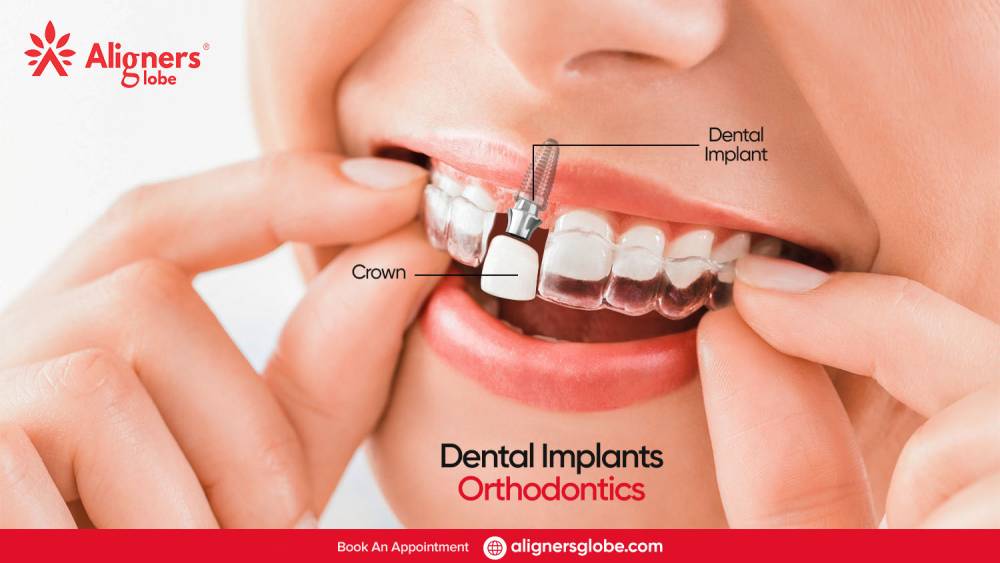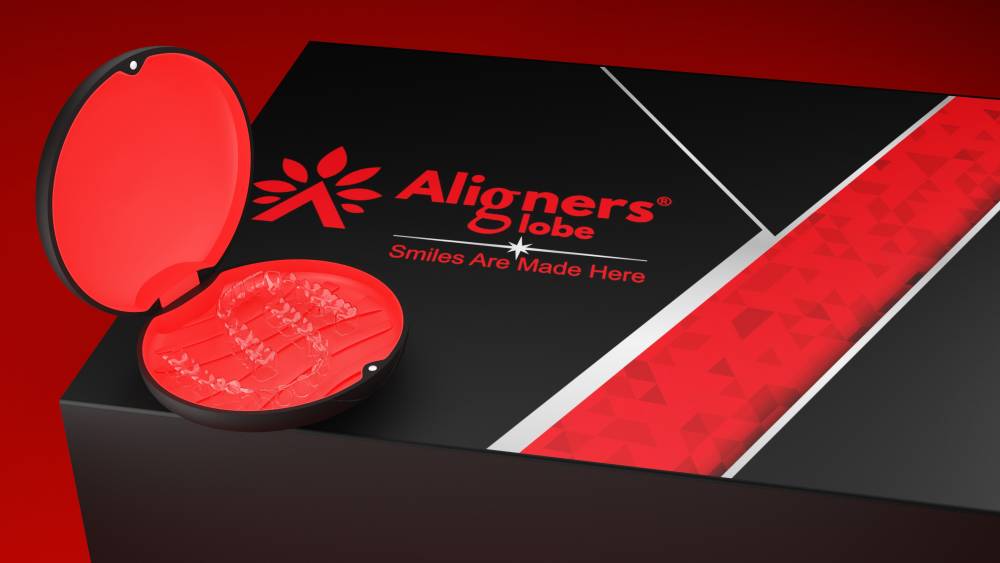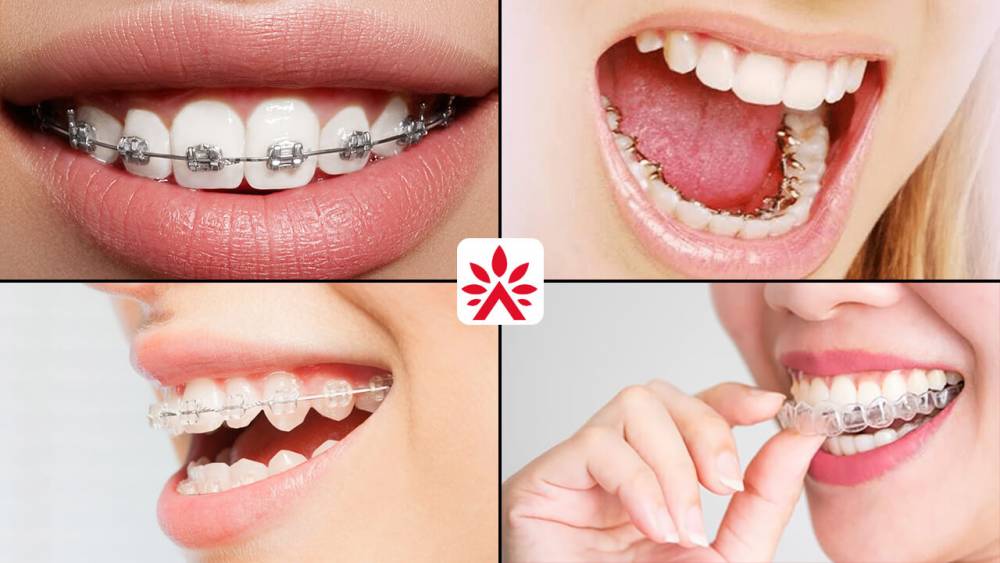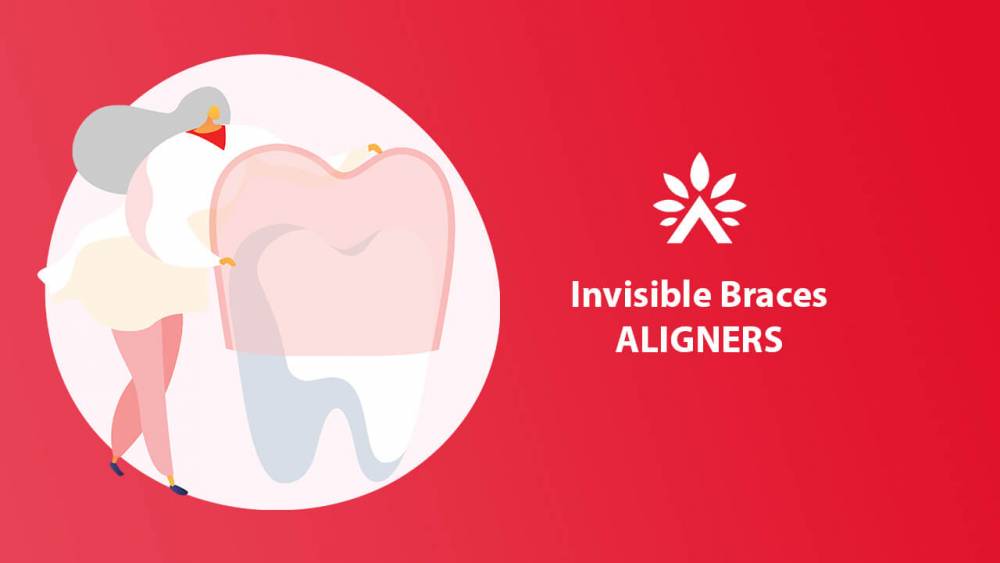
Dental Implant Orthodontics
If you are someone who has to receive both dental implants as well as orthodontic treatment, the ideal situation would be to place braces or Aligners before dental implants and leave the room required for placing dental implants. The braces specialist (orthodontist) and dental implantologist both will decide when to place dental implants before, during, or after treatment with braces or Aligners. In some situations, an orthodontist will close the space with braces or Aligners if the patient is not willing to fill the space with implants due to the cost of dental implants, fear of dental surgery, or else the condition of the bone is not favorable to receive an implant without disturbing the perimeter of a smile curve.
However, there are certain situations where there are gaps or missing teeth and to receive proper orthodontic treatment, those spaces need to be filled through dental implants. Dental implants can't become mobile once they have completely integrated themselves into the bone.
Dental implants cannot move once they are embedded into the bone since they have no PDL fibers attached that can help alter their position however brackets can be placed over the crown and the position of the crown and abutment can be changed accordingly, whenever needed.
Another such scenario where dental implants can be placed before brackets would be if teeth adjacent to the implant do not need alignment or braces.
Implants can also be placed before braces if the dentist intends to make use of them for anchorage for better alignment.
Are Dental Implants The Next Big Thing?
Yes! Dental implants are no longer a hassle!
We frequently come across this question in dental clinics, while treating patients with missing or extracted teeth for better treatment options. In past, if you have one missing or multiple missing teeth, or edentulous (simply having no teeth at all), here were the following treatment options:
1. Dentures Acrylic (hard denture) or Soft denture
2. Porcelain/Zirconia bridge
3. Cobalt chromium (CC) plate
Above all the old methods to restore missing teeth area. Nowadays a more honest answer would be dental implants for your missing teeth and here’s why.
Dental implants are a natural feeling and discreet option for your missing teeth. As technology revolutionized and dental implants came, now one does not need to wear ugly-looking and uncomfortable dentures, sacrificing the neighboring teeth of missing areas for support.
Let’s discuss dental implants in detail!
What is a Dental Implant?
The dental implant is an artificial root that is engrafted into the bone allowing the surrounding bone to grow around it. They are considered to be the most long-lasting and reliable option available in the market today and can usually last you a lifetime if well taken care of.
Dental implants usually preserve the natural appearance and do not cause any destruction to the adjacent sound and healthy teeth and gums. In that way, your smile can look a lot more natural and aesthetic while still being strong. Is that not what everyone wants?
While there are other alternatives available such as bridges, and partial and fixed dentures, the advent of implants has limited their use greatly. For ages, the only alternatives we had for missing or extracted teeth were bridges and removable partial or fixed dentures. But desperate times need desperate measures. With the advent of newer techniques, you can now have a more viable and certainly a better-looking smile through dental implants.
One of the major reasons is that they lose their natural appearance with time; they are not as stable as implants as they can become loose-fitting or tight with time, therefore, interrupting eating habits and hindering speech. All of these problems create difficulty for people in carrying out their everyday activities.
Dental implantologist
Dental implants are performed by specialized professionals called Dental implantologist who have excellent knowledge and the desired expertise in this field.
Parts of Dental Implants
There are three components of dental implant
1. Implant screw embedded in bone
2. An abutment that attaches to the screw
3. Crown
Types of Dental Implants
There are different types of dental implants available today according to material, bone quality and quantity, and time frame. Let's discuss a few of them.
Titanium Implants
Titanium implants are considered the gold standard for implants. They are very durable and long-lasting and are highly wear and corrosion-resistant options available at reasonable prices. Body cells love titanium and make a strong bond with it.
Zirconia Implants
This is the material of choice for people who have metal allergies and cannot go for titanium implants. These implants are also less complex, Limitation is, that it is usually double the cost of a titanium implant.
Orthodontic Mini-Implants/ Temporary Anchorage Devices (TADs)
These are mini-screws, also known as temporary anchorage devices. As the name implies, these devices are temporarily used and act as anchorage points and for extra force to pull the teeth in the right direction. They are generally placed between the roots of teeth such as canines, and posterior teeth such as molars and can also be placed palatally. They are connected to the brackets and help the teeth to move.
Immediate Dental Implants - Single-day Implants
You must be wondering, is there such a thing that you can get Dental implants in a single visit? Yes! So, if you’ve gotten your tooth extracted or you’ve lost a tooth due to a mishap, you do not have to wait for months or weeks to get a replacement done. You can have the implants and temporary crowns on the same day. Later on, temporary crowns are replaced with permanent crowns once the implants have been bone locked.
They are also known as single-day implants, in which implants are placed in the missing area of your teeth with a crown and also immediate dental implants are those implants that are placed right after the extraction of the tooth with or without bone graft and membrane, either with or without temporary crown or on them? Dental Implantologist will decide if you are a perfect candidate for immediate implant or not according to your case scenario because every patient is not a suitable case for immediate dental implants.
There are clinical set-ups in some countries that have the facility of dental clinics, dental laboratories, and implant fabrication units in a single building, where you can get dental implants done on the spot. These clinics also facilitate hoteling for patients who have come from far-off places and other countries to get their treatments done on the same day or a couple of days.
Who Needs Dental Implants?
If you are someone who has recently lost their tooth due to decay, any sort of injury, road traffic accident, trauma caused by a blunt force, if the tooth has been cracked beyond repair or it has simply been extracted because it can no longer be salvaged through root canal treatment, then you’re just the right person for getting dental implants.
Who says you have to live without teeth or put up with uncomfortable dentures when you become old? Dental implants have got your back. They can be given as single implants, all-on-four implants; full mouth implants retained bridge depending upon how many teeth are missing.
They are the most long-lived treatment available today. You could be old yet still have a comfortable and aesthetic picture-perfect smile through full-mouth dental implants.
The procedure of Dental Implants
Before you can carry on with the treatment we have to evaluate you through the following series of steps
Initial Consultation with Dental Implantologist
After booking an appointment with a dental implantologist, they will do initial consultation in which they will ask questions regarding oral hygiene maintenance, reasons for missing teeth, family history, socioeconomic status, regular checkups with the dentist, take a thorough history of medical issues if you have, yours expectations, budget, and move toward dental examination.
Extensive oral examination
After consultation, the dental implantologist will review your oral health, teeth, mouth opening, and mucosa especially surrounding the missing area, and will do extra oral examination including the Temporomandibular joint. After clinically examining and thorough previous dental and medical history they will also take impressions of your teeth and gums to create models to work on.
The next step is to take dental radiographs of missing areas where they are going to put implants to check if getting implants would be the best choice for you or not and will guide the patient about the types and brands of dental implants that are going to be used. The best X-ray for a dental implant is cone beam tomography.
Evaluation through Cone Beam Computed Tomography (CBCT)
Dental implant surgery is just like engineering. When a constructor aims to build something, they first check whether the soil has the maximum capacity to endure all that strength. Such is the case with dental implants.
CBCT is a specialized three-dimensional (3D) scan that helps to record detailed anatomy and determine the quality and quantity of bone available and whether or not the patient will require bone augmentation. But that’s not all. CBCT can do amazing jobs for us leaving absolutely no room for any errors. A major factor to be considered in your treatment is the quality of your bone.
The bone acts as the foundation and the strength dictated by the quantity and quality of the bone determines the ultimate success or failure of the treatment for dental implants.
CBCT also helps us in locating the important anatomical structures that could encounter or potentially become a hindrance such as nerves and sinuses located in the region, to avoid any troubles or injuries in the surgery area.
Digital Implant Workflow
If your missing teeth areas are suitable for digital implantology, decided by your dental implantologist and your preference, after evaluation from CBCT radiograph and plaster cast models, putty Impressions or digital impressions of jaws are taken with the help of an intraoral scanner. A stent is fabricated and a guide is prepared according to the selected dental implant size and diameter in the laboratory. A stent has a hole in exactly the place where the implant is supposed to be drilled in the bone. Dental Implantologist would hardly take 5mins per implant with the guided surgical kit to drill the dental implant in its place.
This is a quick and easy process and requires minimal surgical invasion than conventional dental implant surgery which requires a flap to be raised for placing an implant. You’re immediately taken ahead of the procedure.
Factors Influencing the Success of the Dental Implant Treatment
There is always an ideal case scenario when considering a patient who needs dental implants.
Is this the best treatment option for a patient? Is the patient in the right age group to get the treatment? Is there any co-morbidity that could potentially put our patient at risk? Is there enough quality and quantity of bone that is present, as dental implants require a substantial quantity of healthy bone for successful osseointegration (a process in which the implant forms a firm bond with the bone present around the implant). All these are certain factors that need to be evaluated carefully.
At what age we can get Dental Implants
Children and adolescents till 18 years are not considered ideal candidates for dental implants because their facial profiles and jaws are not fully developed which plays a major role in the long-term success of dental implants. Other than children or teenagers, everyone can become a candidate for getting implants ranging from 18 to 80 years of life.
Underlying Health Concerns
With the fast-spreading pace of innovations in science, even patients with cardiovascular diseases and chronic diabetes can now become candidates for dental implants. There are prophylactics measures and medications; there is no uncertainty that can render them unsuitable for getting the smile they want.
Inadequate Bone
Inadequate bone indeed poses a serious challenge for people seeking dental implant treatment but that should not be a problem anymore. With the advancement of newer techniques, artificial bone can be grafted through various bone grafting methods for better outcomes.
Pre-Existing Gingival Diseases
It is imperative that people who are going for dental implants need to have healthy gums. Dental implants can act as a reservoir for bacterial growth hence the rejection of Implants is high. Therefore, they need to be placed in healthy sites instead of diseased sites.
However, there’s a solution to every problem. Pre-existing gum diseases can be treated with a proper course of antibiotics or surgical techniques such as curettage, tissue grafting, or gingival pocket surgeries.
Digital Implantology-Latest technology in dental implants
Do you wish to overcome all Your Dental Phobias for dental implant surgery?
Scared of incisions, blood, and stitches in dental implants?
Dental implants are no longer time-taking, back-breaking, or scary.
Are you afraid of getting implants because they are too daunting? Digital implantology is just the right thing for you! Here’s why
Some people encounter clinical set-ups who are hesitant to get implants because it's ‘unnerving and scary’ as they will have to deal with scar marks, stitches, and bleeding involved in implant surgery. Digital implantology has therefore made this entire experience very patient-friendly, requiring no guesswork. It’s beyond the conventional radiographic technologies and is considered the current best solution which is highly appreciated and even demanded by the majority of the patients. Digital implantology has put an end to all your worries as it is less invasive and relies on no guesswork. The whole treatment is planned through CBCT and carried out virtually thus minimizing the extra surgical invasion that is otherwise done.
Not only has it made treatments far more efficient and quick but has also helped people in overcoming their dental phobias and has made the whole experience rather fascinating. There are also a lot of people who suffer from dental chair anxiety that greatly prevents them from getting their desired treatments. But digital implantology has helped people in overcoming their fears and made dental experiences less torture for them
Through digital implantology, we can envision exactly what the treatment outcomes would be in 3D to express all the details of the jaw and the intraoral scanner helps to record every feature of the dental implant sites, neighboring teeth if present as well as gums. It has minimized intraoral invasion to a greater extent due to its precision as the implant and crown have been pre-designed before the surgery. It has also accelerated the time taken to plan and carry out treatment procedures in a few minutes which is otherwise quite a lengthy process. With the fast-moving pace of science and technology, digital implantology has taken dentistry by storm. Now no need to worry! Because this evolution of digital implantology like in other medical sciences eliminated the wound, blood, and stitches, now you can have full mouth implants in an hour or a single implant in just 10 minutes.
Note: Post-op care is almost negligible in the case of digital implantology.
Post-operative care after dental implants
You are given the following post-operative instructions that ensure your comfort after you are done with your dental implant surgery; hence they should be followed properly.
• Keep the gauze or cotton with slight biting pressure on the surgical area for 45 minutes and avoid talking to anyone during this time.
• After removing the gauze, you are advised to take your prescribed medicine with water or milk. It is also advised to have ice cream but you should avoid it if you’re diabetic.
• For the next 24 hours following surgery, you should avoid spitting too much or drinking anything with straws.
• Smoking is prohibited for 7 days.
• For the next 24 hours following surgery, you should consume a soft and cold diet and avoid all sorts of hard or hot eatables or drinks.
• For the next 24 hours following surgery, you should avoid touching the surgical site with your tongue or finger.
• In the following 48 hours, it is common for a little bleeding or swelling but it subsides on its own. If it does not go away on its own, you should contact your implantologist immediately.
• Brushing should be continued as per the normal routine but brush the surgical area 24 hours after surgery.
• You should do saline rinses after 24 hours (1 tsp. of salt in 8 oz. water) twice a day and continue doing this for the next 3 days. Great caution must be exercised if you have hypertension.
• If a bone graft has been placed then you will feel a gritty texture in the mouth but it will go away on its own in a few hours following the surgery.
• If you are given any medication such as analgesics, it should be taken as prescribed by the implantologist.
• To keep your teeth, gums and dental implants healthy, it is recommended to go for a follow-up annually.
Note: All of the above are common post-operative instructions given by your dental implantologist. It can vary according to your particular case.
Patient Care Guidelines
There are certain things that the patient should know before dental implant treatment. The patient needs to have appropriate and relevant knowledge about the:
• Brand of the implant
The first and foremost thing is to let the patient know which company implant is being used. There are almost 12k companies for implants available today like Straumann, Envista, BioHorizons, Osstem Implant, etc. it is preferable to select the implant company which is readily available in the country that the patient resides in. It makes future consultations and follow-ups easier.
• Dental Implant Box
Each dental implant system has its dental implant box specific to that implant system, bone configuration, and the specific type of implant that is being used. The patient has to be provided with their implant box in case the patient decides to pursue their treatment with another dentist in the future or you can ask your dental implantologist for the implant box and radiographic records.
• Type of Crown
The patient also has to be informed about the type of crown that is being used. There are a variety of crowns available in the market and they differ based on material and cost. The different crowns being used are Zirconium, Porcelain fused to metal (PFM), Emax, Gold, Acrylic (PMMA), or composite resin. The patient must also be informed whether the crown being used is a screw-retained crown or cemented crown.
• Financial Investment
The patient must ask about the whole cost of the dental implant treatment. Dental implant treatment includes implant placement and crown. Clear the whole cost of dental implant treatment before starting the procedure because there is a separate cost for the crown depending upon which type of crown is being used. Also, don’t forget to ask about the charges of the guiding stent included in the whole package price if the case is done by digital implantology.
• Patient Assurance
The patient also needs to be guaranteed the success of the treatment since the patient is investing their time and money into getting this treatment done.
• Dental Insurance
The patient has informed the dental implantologist about dental insurance coverage. The coverage of dental implant insurance relieves the patient of financial burden. Dental Insurance either runs through the benefit year or calendar year and it is essential to know when the benefits reset so that the patient can align their treatment plan with their benefit renewal accordingly.
Are you looking for a Top, experienced, and best dental implantologist in Lahore for fixed teeth with dental implants for parents, and grandparents who hesitate due to wounds, pain, scars, and stitches?
You don't need to worry now.
We are placing single dental implants to full mouth dental implants without wounds and stitches at DENTAL ART
Frequently asked questions
What are the drawbacks of getting dental implants?
There are no specific downsides to getting dental implants. Recent technologies have made this whole procedure completely hassle-free. Choose your Implantologist wisely, because he is the one responsible for safe Implants.
How long do dental implants last?
Dental implants are artificial teeth that serve as replacements for natural teeth and hence require a lot more care than natural teeth. If you take care of your dental implants and keep your oral hygiene up to the mark, then you have nothing to worry about. They will last as long as you want. Minimum 20 years you can expect the dental implants to last.
Is the dental implant procedure painful?
The dental implant procedure is no longer a painful one due to the tremendous advancements done by science today. Remarkably well-developed technologies like digital implantology are now available which will help you get pain-free dental implants.
Are dental implants likely to have cavities?
Dental implant crowns are not vulnerable to cavities like our natural teeth are. They are made out of metal, porcelain, or zirconia so the bacteria that is responsible for causing decay in natural teeth does not affect the dental implants in any way.
Do you get stitches after dental implant surgery?
Previously with conventional methods, sutures (stitches) used to be given around the implants. But now, digital implantology has got us all covered. We no longer need to have sutures or scars with dental implants.
How many days of rest are required after dental implant surgery?
There is no need for you to miss work after getting your dental treatments done if you follow proper post-operative instructions given by your dental implantologist.
Digital implantology has played a major role in this aspect as well by reducing an hour-long procedure to just a few minutes thereby reducing post-operative complications.
Can I drink coffee or tea after getting dental implants?
You just have to avoid hot beverages in the following 24 hours. After 24 hours you can enjoy your tea/coffee.
Will my crown get stained?
It is not likely for crowns to get stained if you follow proper oral hygiene protocols. In addition, there is also a stain-resistant glaze present over them that prevents staining or any sort of discoloration.
How lengthy is the process of getting dental implants?
It usually takes up to an hour for the dental implant procedure. But even that has been reduced to just a few minutes through digital implantology. Digital Implantology means the insertion of Implants by stent without giving any incision, so it's an almost walk-in procedure with hardly 5 minutes per implant.
Are dental implants worth it?
Yes. Most definitely. Dental implants are a great alternative to having natural-looking teeth and their lifetime warranty is worth every second of one’s time and financial investment that goes into the treatment. It is not only for rehabilitation for chewing, and aesthetics but also for the preservation of natural bone.
Dental implant cost
The cost of a dental implant varies from case to case. The dental implant price usually ranges between 2000 USD to 6000 USD in different countries.
Dental implant cost depends on the following factors:
- Type of dental implant (conventional implant/ zygomatic implant/ orthodontic implant/ basal implant)
• Type of crown that is being used.
• Brand/ company of the dental implant used.
• Location of clinic
• A dentist or a Dental implantologist
• Experience of Dental implantologist
• Preference for digital implantology
• Dental hospital/ dental teaching hospital/ private clinic
• whether or not the patient needs additional procedures like bone augmentation, sinus lift, nerve repositioning
• Dental insurance coverage
• Single or full mouth implants
Cost of a dental implant in Pakistan
Dental implant cost in Pakistan usually starts from Rs.75000 and goes up to Rs.250,000, and it depends upon the factors discussed above.
Posted On 07 Sep, 2022


